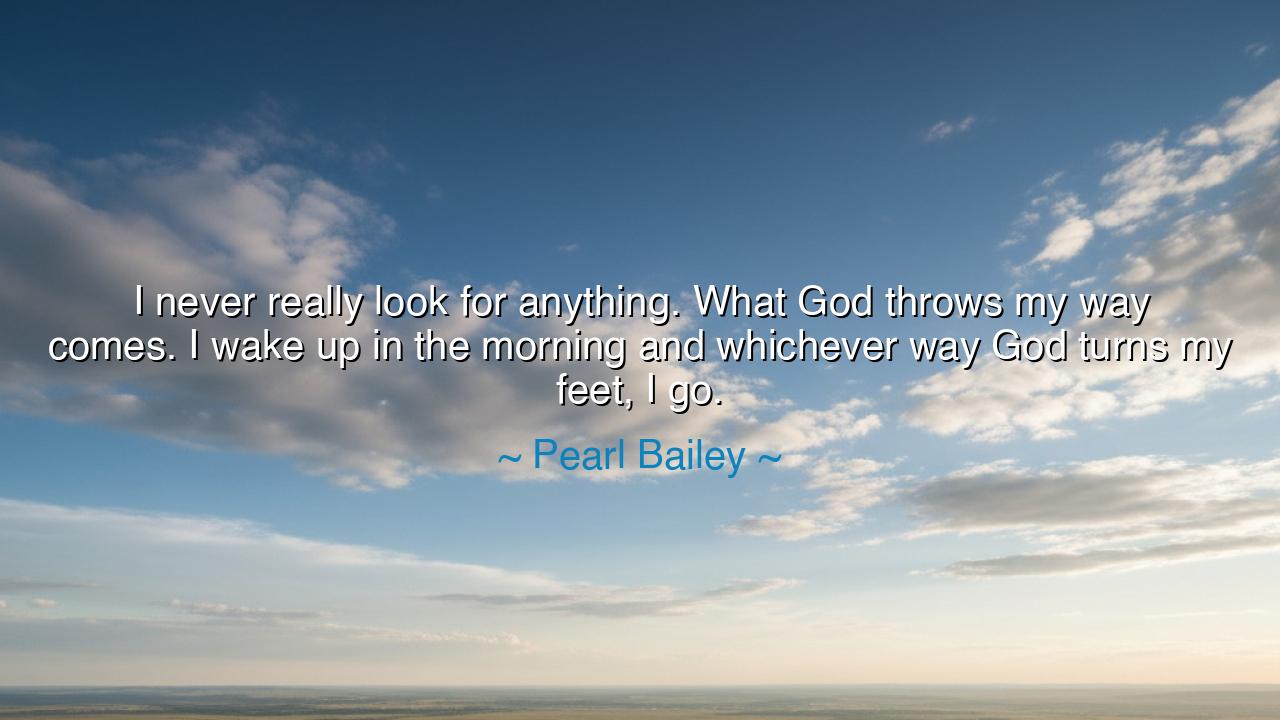
I never really look for anything. What God throws my way comes.
I never really look for anything. What God throws my way comes. I wake up in the morning and whichever way God turns my feet, I go.






Hear the voice of Pearl Bailey, who sang with soul and spoke with wisdom, saying: “I never really look for anything. What God throws my way comes. I wake up in the morning and whichever way God turns my feet, I go.” These words, though simple, carry the weight of surrender, of trust, of the ancient knowledge that life is not always shaped by striving, but by yielding to a higher hand.
When she says, “I never really look for anything,” she is not speaking of idleness or despair. Rather, she speaks of release—release from the anxious clawing after what we think we must have. The world often teaches us to chase, to force, to grasp at destiny as though it were prey. But Bailey teaches otherwise: that life flows more freely when we learn to receive, when we trust that the divine will bring what is needed, even if not what is expected.
Her faith lies in the phrase “what God throws my way comes.” She sees the events of life not as accidents, nor as products of blind chance, but as gifts, even trials, sent with meaning. In this, she stands with the ancients, who believed in Providence—the unseen guidance of a hand greater than their own. To live in such trust is to find peace in both fortune and misfortune, for both are understood as part of the same divine design.
The image of waking in the morning and going “whichever way God turns my feet” is a vision of surrender and courage. Each day begins as an uncharted journey, the path not known until the step is taken. It is an act of faith to rise and walk without certainty, to allow the unseen to guide the seen. Bailey’s words remind us that freedom does not come from control, but from trust—from knowing that even when we do not see the road ahead, we are being led.
History speaks in harmony with her voice. Consider the story of St. Francis of Assisi, who cast aside wealth and worldly ambition to live in poverty and service. He did not chart out a great plan for fame; he simply followed, step by step, the call he believed was from God. From such surrender came a movement that reshaped hearts across centuries. Like Bailey, Francis did not demand to choose his path but allowed his feet to be turned by the divine.
The deeper meaning of her words is that striving without trust leaves the soul weary, while trust without striving leaves the soul free. This is not a call to abandon effort, but to release the illusion that effort alone determines destiny. There is a higher rhythm, a greater melody, in which each life is but a note. To live in harmony with that melody is to find joy even in uncertainty, and strength even in weakness.
The lesson for us is clear: do not be enslaved by the need to control every outcome. Begin each morning with openness, ready to walk the path that unfolds before you. Seek not only to chase dreams with restless hunger, but to trust that what comes carries purpose. The practical action is this: when you rise, instead of asking, “What must I take?” ask, “Where shall I be led?” Live with readiness, gratitude, and trust, and you will discover peace in both triumph and trial.
Thus, Pearl Bailey’s words stand as a hymn of surrender. She teaches that true freedom lies not in forcing life into our shape, but in letting God shape us through life. For the one who lets their feet be guided by the divine hand does not wander aimlessly—they walk the path of destiny itself.






AAdministratorAdministrator
Welcome, honored guests. Please leave a comment, we will respond soon